Non-stick Cookware and Cosmetics Linked to Increased Thyroid Cancer Risk
- Global First: Bovine Avian Influenza Transmission to Humans Detected
- Potassium-Enriched Salt Substitutes: Reducing Blood Pressure Risk?
- Tritium Detection in Fukushima’s Seawater: Below Safety Standards
- What Reason Let AstraZeneca Withdraws COVID Vaccine From The Market?
- How Many Times Can a Cancer Patient Undergo Chemotherapy?
- What are the WHO recommendations for Japanese encephalitis vaccines?
Non-stick Cookware and Cosmetics Linked to Increased Thyroid Cancer Risk
- AstraZeneca Admits for the First Time that its COVID Vaccine Has Blood Clot Side Effects
- Was COVID virus leaked from the Chinese WIV lab?
- HIV Cure Research: New Study Links Viral DNA Levels to Spontaneous Control
- FDA has mandated a top-level black box warning for all marketed CAR-T therapies
- Can people with high blood pressure eat peanuts?
- What is the difference between dopamine and dobutamine?
- How long can the patient live after heart stent surgery?
Non-stick Cookware and Cosmetics Linked to Increased Thyroid Cancer Risk
PFAS, per- and polyfluoroalkyl substances, often referred to as “forever chemicals,” are used in the manufacturing of cosmetics, non-stick cookware, waterproof gear, and firefighting foams due to their unique physical and chemical properties.
PFAS pose a potential threat to human health and the environment, with some studies suggesting that exposure to high concentrations of PFAS may have adverse effects on the human liver, immune system, and be linked to certain cancers, reproductive issues, and developmental problems.
Over the past few decades, the global incidence of thyroid cancer has seen a significant increase. Between 1974 and 2013, the average annual increase in thyroid cancer rates in the United States was 3.6%.
On October 24, 2023, researchers from the Icahn School of Medicine at Mount Sinai in the United States published a study in the “eBioMedicine” subsection of “The Lancet” titled “Per- and polyfluoroalkyl substances (PFAS) exposure and thyroid cancer risk.”
The study reveals a connection between PFAS found in non-stick cookware and cosmetics and an increased risk of thyroid cancer. Specifically, for every one-fourth increase in the concentration of linear perfluorooctane sulfonic acid (n-PFOS), the rate of thyroid cancer diagnosis increased by 56%.
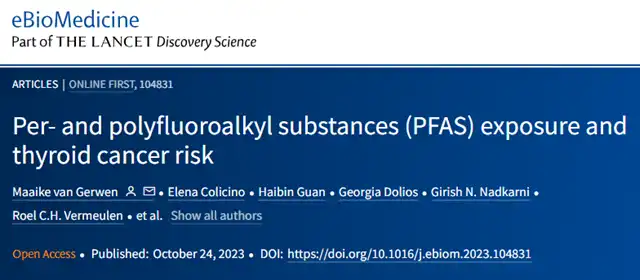
In this study, researchers analyzed a biobank related to medical records at the Icahn School of Medicine at Mount Sinai, including 88 thyroid cancer patients and 88 non-cancer control subjects. Blood plasma samples were collected from these patients before or at the time of diagnosis, and the relationship between blood plasma PFAS levels and thyroid cancer diagnosis was examined.
Using liquid chromatography-high-resolution mass spectrometry and untargeted screening analysis, researchers measured eight blood plasma PFAS and compared the differences in PFAS levels between the group of participants with thyroid cancer and the healthy participants.
The results indicated that for every one-fourth increase in the concentration of linear perfluorooctane sulfonic acid (n-PFOS), there was a 56% increase in the rate of thyroid cancer diagnosis. This positive correlation remained consistent after adjusting for all seven other PFAS in a continuous model.
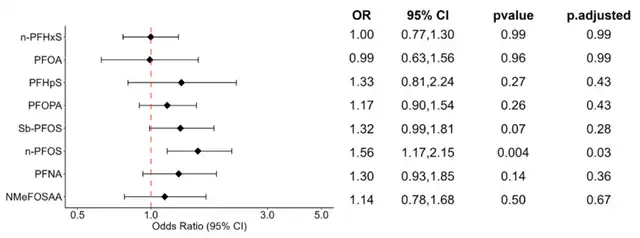 Association between plasma PFAS concentrations and thyroid cancer
Association between plasma PFAS concentrations and thyroid cancer
Furthermore, the researchers analyzed blood plasma PFAS levels in 74 patients with papillary thyroid cancer and found similar results: a 56% increase in the rate of papillary thyroid cancer diagnosis for every one-fourth increase in the concentration of linear perfluorooctane sulfonic acid.
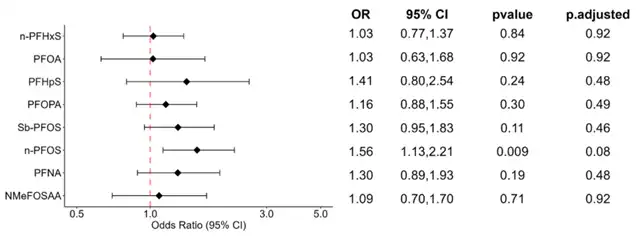
Plasma PFAS concentrations linked to papillary thyroid cancer
The researchers conducted additional analysis on 31 patients who had been in the study for at least one year from enrollment to thyroid cancer diagnosis to account for the time gap between exposure to PFAS chemicals and the onset of the disease. This analysis revealed a significant association with thyroid cancer diagnosis for linear perfluorooctane sulfonic acid and several other PFAS compounds.
The researchers emphasize that these findings further confirm the hazards of PFAS to human health. In today’s world, avoiding PFAS exposure is nearly impossible, and it is hoped that these discoveries will raise awareness about the seriousness of these persistent chemicals, with the ultimate goal of reducing PFAS exposure.
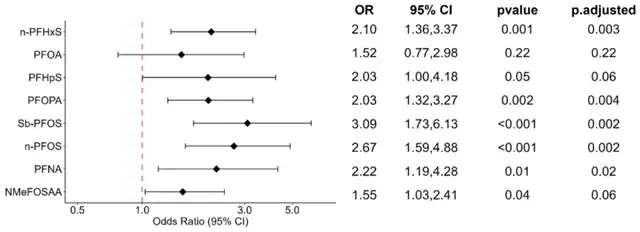
It’s worth noting that previously, researchers from the Icahn School of Medicine at Mount Sinai and Harvard University published a study in the journal “Science of the Total Environment” titled “Exposure to perfluoroalkyl substances and women’s fertility outcomes in a Singaporean population-based preconception cohort.” This study found that PFAS may reduce women’s fertility by up to 40%, impacting female reproductive and fertilization capabilities.
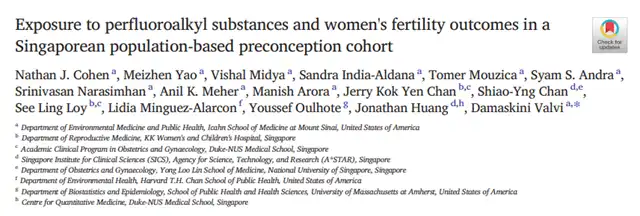
[Paper Links:
https://doi.org/10.1016/j.ebiom.2023.104831
https://doi.org/10.1016/j.scitotenv.2023.162267]
Non-stick Cookware and Cosmetics Linked to Increased Thyroid Cancer Risk
(source:internet, reference only)
Disclaimer of medicaltrend.org
Important Note: The information provided is for informational purposes only and should not be considered as medical advice.



